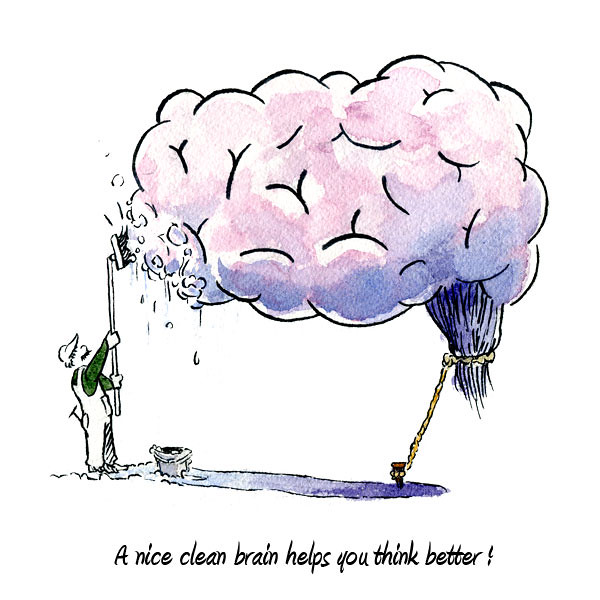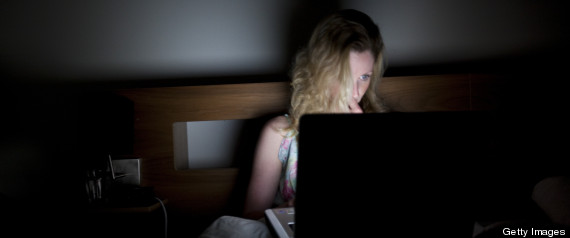Ironically, I am writing this while my sleep withdrawal is at such a point that I am chugging raw garlic and crystallized ginger in a desperate attempt to fend off the inevitable cold that accompanies my insufficient rest.
Sleep is a mysterious being, especially taking in evolutionary imperative to survive. Sleep, which leaves us at a defenseless disadvantage, must have a very important purpose. Whatever benefits that have been discovered until now doesn't seem to quite justify the possibility of getting eaten; Maria Konnikova (one of my new favorite contributors to the "Sunday Review") presents a new theory.
"Goodnight. Sleep Clean": You know how we always say that dreams are the brain's way of working out matters that were pushed mentally aside during the day? That's the software aspect. But there is also the hardware, chemically speaking.
Recall what happens to your body during exercise. You start off full of energy, but soon enough your breathing turns uneven, your muscles tire, and your stamina runs its course. What’s happening internally is that your body isn’t able to deliver oxygen quickly enough to each muscle that needs it and instead creates needed energy anaerobically. And while that process allows you to keep on going, a side effect is the accumulation of toxic byproducts in your muscle cells. Those byproducts are cleared out by the body’s lymphatic system, allowing you to resume normal function without any permanent damage.
The lymphatic system serves as the body’s custodian: Whenever waste is formed, it sweeps it clean. The brain, however, is outside its reach — despite the fact that your brain uses up about 20 percent of your body’s energy. How, then, does its waste — like beta-amyloid, a protein associated with Alzheimer’s disease — get cleared? What happens to all the wrappers and leftovers that litter the room after any mental workout?
“Think about a fish tank,” says Dr. Nedergaard. “If you have a tank and no filter, the fish will eventually die. So, how do the brain cells get rid of their waste? Where is their filter?”
Cool, huh?

The Star Trek: The Next Generation episode, "Night Terrors," wasn't so off base (the entire crew is mysteriously robbed of R.E.M. sleep, which makes another ship kill each other after hallucinations drive them mad).
But the current state of snoring affairs is pretty bleak. With glowing technology, sleep doesn't get priority, and it is vital, on so many levels.
At the extreme end, the result could be the acceleration of neurodegenerative diseases like Alzheimer’s and Parkinson’s. While we don’t know whether sleep loss causes the disease, or the disease itself leads to sleep loss — what Dr. Veasey calls a “classic chicken-and-egg” problem — we do know that the two are closely connected. Along with the sleep disturbances that characterize neurodegenerative diseases, there is a buildup of the types of proteins that the glymphatic system normally clears out during regular sleep, like beta-amyloids and tau, both associated with Alzheimer’s and other types of dementia.
Shiver.
The are some very, very, very blessed individuals (like my father, brother, and sister) who can lay down and pass out almost immediately, so for them, sleep deprivation isn't such a stressful issue ("I was up for five minutes in the night! Imagine!" Oh, boo-hoo.) But for many of us, sleep doesn't just happen, and should take note of what personal criteria have to be met to ensure dozing off.
Screens, whether they be television, computer, or smartphone, emit what is known as "blue light," a wavelength that toys with the chemical mechanics of sleep, and should be shunned past a certain time (in my case, no exposure past 9. On Friday nights I fall asleep a lot quicker, and I think it is because I haven't been near blue light since early afternoon).
 |
| NOOOOOOO! |
As Pesach-time approaches, remember that even the brain needs a proper clean-out, and treat yourself to an early tuck-in.
No comments:
Post a Comment